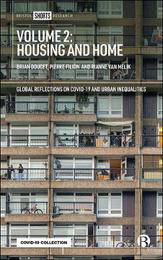
|
Volume 2: Housing and Home
Hardback
Main Details
Description
Reflects not only on the challenges but also the opportunities facing cities in the wake of COVID-19 and showcases how the pandemic (and its economic fallout) have created new inequalities while exacerbated existing ones. The COVID-19 pandemic was not a great 'equaliser,' but rather an event whose impact intersected with pre-existing inequalities affecting different people, places and geographic scales. Nowhere is this more apparent than in housing. Written by an international group of experts, this book casts light on how the virus has impacted the experience of home and housing through the lens of wider urban processes around transportation, land use, planning policy, racism and inequality. Case studies from around the world examine issues around gentrification, housing processes, design, systems, finance and policy. Offering crucial insights for reforming cities to be more resilient to future crises, this is an invaluable resource for scholars and policy makers alike.
Author Biography
Rosalie Warnock is Research Associate in the Department of Social Policy and Social Work at the University of York. Loretta Lees is chair of human geography at the University of Leicester, UK. Brian Doucet is the Canada Research Chair in Urban Change and Social Inclusion and an Associate Professor in the School of Planning at the University of Waterloo, Canada. Pierre Filion is Professor at the School of Planning, University of Waterloo, Canada. Rianne van Melik is Assistant Professor in Urban Geography at the Institute for Management Research (IMR), Radboud University, Nijmegen, the Netherlands.
|